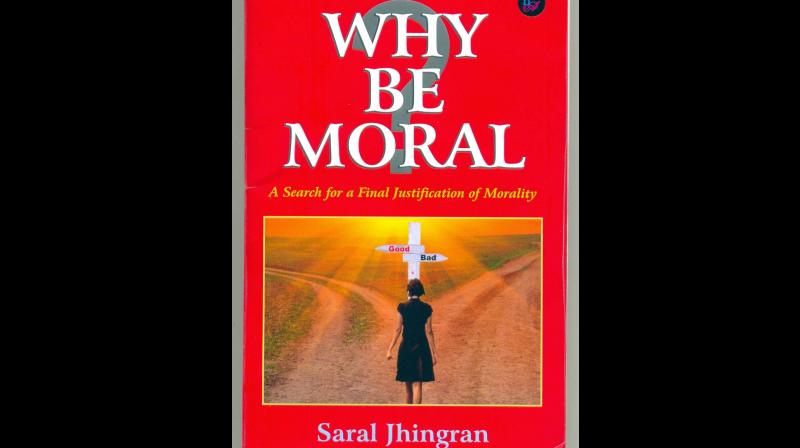How Kant, Gandhi are antidotes to religious fundamentalism

The wave of ‘hate crimes’ in the past week in the U.S. beginning with the killing of Hyderabad-based Indian engineer, Srinivas Kuchibhotla, and nearer home an ideological battle raging in Delhi University campuses - Ramjas college being the latest – between right-wing students group and upholders of traditional liberal values, flag a deep disconnect, showing up the mirror to radical re-evaluation of values in the making.
Competing value-systems are virtually coming to blows on the streets, to put it mildly, while rising religious fundamentalism, if not downright sectarianism, offers the promise of ‘neat and smart solutions’ to all our anxieties, from lifestyles to identity politics.
It is, unwittingly, in this backdrop, this Delhi-based, distinguished woman philosopher, Dr Saral Jhingran, has attempted a daring and ambitious enterprise in her latest work, to rationally set out the foundations of a ‘universal secular ethics’ sans dipping into religion.
“Why Be Moral?” The title itself is provocative enough, for it is an increasingly anxious, assertive and aspirational middle class that is mainly asking this question. This is not an issue for parents who have “given up” on their incorrigible children, or for those few people in any society who are ‘naturally moral’, saints without having to be ‘Hindutva’!
Dr Jhingran contends that this question bothers largely one group of persons in a modern society today – “that, those who have normal desires and ambitions but still mostly act according to moral rules, again according to their initial training. However, they may find that their personal interests are often in conflict with what the moral law demands. So they think or ask why should they be moral?”
The haunting sense behind this query is even more acute for a sub-class of this group, whom the author says “make up the vast majority of any society”, as they feel that a little diversion from the moral path “is not very great”, as long as it neither consciously harms other people, nor invites large-scale “social disapprovals”.
She believes most cases of “habitual corruption or injustice” (In India they are rooted in deep inequalities and inter-personal indifference tagged to caste system), stems from this largely I-an-okay-you-are-okay syndrome.
Though people are aware of the basic ‘rights’ and ‘wrongs’- truth-speaking, honesty, non-cheating, non-killing, not hurting or harming others, keeping a promise, being trustworthy etc., the grounds or justification for an ‘action X’ to be morally defensible, than say ‘action Y’, is riddled by relativistic positions.
So, Dr Jhingran sees the biggest challenge as, in the absence of rational moral principles, which are person and culture-neutral and universally valid, society will plummet into chaos and anarchy. Such principles should stand on their own, independent of religions, to qualify as secular.
It is in this backdrop that Dr Jhingran has gone about an exhaustive critical study of various concepts, theories of ethics and morality, both in Indian and Western philosophical traditions. In the Indian system, the concept of ‘Dharma’ is so unique and comprehensive as it includes both “virtues and duties” that the West compartmentalised.
In the modern period, the popular ‘utilitarian’ views of what is ‘good’- its best known version is ‘what promotes the maximum happiness of the maximum number’ - has permeated thinking on moral issues in the West in one form or other.
But Dr Jhingran, in this painstaking work, pegs her defence of a “universal, secular ethic” in the views of two great 18thcentury European philosophers – the Enlightenment era thinkers who set much store by the constructive powers of human reason - German philosopher Immanuel Kant and Scottish philosopher David Hume - as providing that basic framework and ‘final justification’ for a new moral theory with a humane outlook.
To stress the point that the ‘sentiment of humanity’, however weak it may be, “is the only foundation of morality”, Dr Jhingran quotes the immortal words of Hume to say, despite the co-presence of the “dove, along with the wolf and the serpent” in human affairs, there is still “some benevolence, however small, some spark of friendship for human kind… which when everything else is equal, produce a cool preference of what is useful and serviceable to mankind above what is pernicious and dangerous to mankind.”
So, if sympathy for human suffering is the driving force of the vehicle of morality, the project is completed in action with the “categorical and universalisable moral obligation” that Kant spoke of as being sin qua non for man to be rational, useful and happy. “Equally important is the Kantian right for dignity (of the individual self) which demands respect for others.
These natural rights of men give rise to others’ obligations towards them. The rule of reciprocity would apply here as they (the other) would also have similar obligations,” writes Dr Jhingran, seeing Kant as completing Hume’s benevolent cycle.
Thus, Kant’s emphasis on the “virtue of doing one’s duty” without expectation of any reward is, in a contemporaneous setting, seen by Dr Jhingran as being comparable to Mahatma Gandhi’s “greatest message of Ahimsa”.
For Gandhi, she says, ‘Ahimsa’ was not just rejection of violence, but “giving up all intolerance to the ways of others which is mostly the cause of violence. Gandhi declared that Truth is the exclusive property of no single scripture,” she adds, to stress how intolerance leads to dogmatic fundamentalism. Philosophically, Dr Saral Jhingran’s canvas is so huge, still left for contestations, but her bold strokes show the entire world is still not yet Donald Trump!

